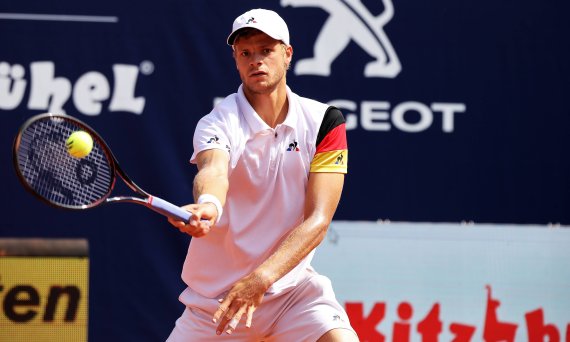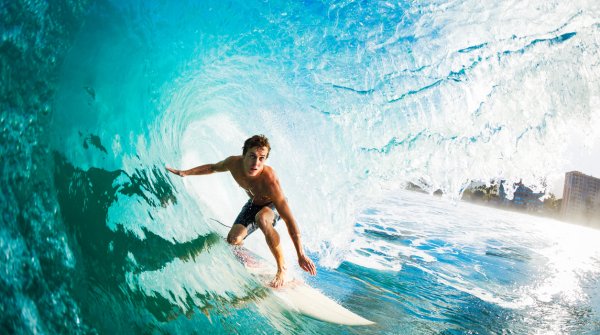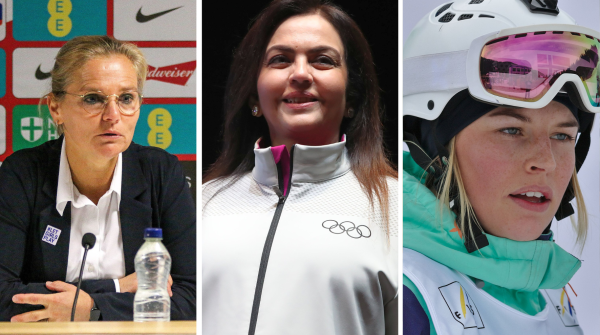
Maximilian Marterer (23) and Yannick Hanfmann (27) are among Germany's best tennis players. Marterer, from Nuremberg, has been a professional for three years, is currently 74th in the world rankings and has won $1.1 million in prize money so far. Hanfmann from Karlsruhe has also been a professional for three years, is ranked 158th and has earned almost 370,000 dollars in prize money. Both train in Oberhaching at Tennis Base, the men's base of the German Tennis Federation. A conversation about money, parents, Instagram, and the question of business or economy class.
ISPO.com: Gentlemen, let's talk about money! Tennis pro - that sounds like a dream job: traveling the world, always playing in the warm, and earning a pile of money in the process. If only it were that easy! What's the secret? How do you manage to make a living from playing tennis?
Yannick Hanfmann: Ha! Playing well helps.
Sure. But how do you get there?
Maximilian Marterer: Tennis is a sport in which you first have to invest a lot. You need the help of your family, which almost inevitably has to invest in your career first. I myself didn't receive any support from the district when I was young. I turned down the offers I then received in order to continue working with my home trainer.
How old were you then?
Marterer: 12, 13 years old. When I played a little better at 15 or 16, I was already earning some money from league games.

From which league onwards is money paid in tennis?
Marterer: For me, it was in the regional league and the second league. I already had a few long-term sponsors.
When did you start getting sponsors?
Marterer: When I was 16, and since then I've been with Adidas and got a national contract because I once played in the final of the German championship. I was also quite successful in the European youth tournaments, number one in the U16s.
At what point were you able to make a living from tennis without sponsorship from your parents?
Marterer: In general, the first thing is to perform, to be successful and to live mainly from the prize money. In the end, the sport comes first, and ideally you want to earn money from it throughout your life.
From what rank onwards is tennis profitable?
Hanfmann: If you're in the top 100 and play the Grand Slams, you have a good income, around 200,000 euros. If you're ranked between 130 and 170, you can live on that and make ends meet.
Like you are right now.
Hanfmann: Exactly. Of course, it always depends on where you play well. If I play well at the Grand Slams and the ATP tournaments, then there's a lot of money in the till. In the Challenger tournaments, of course, there's a lot less.
And even these tournaments in the smaller categories don't always take place on your doorstep, but often on the other side of the world - travel costs being a key factor.
Hanfmann: That's quite a lot. Here at the base in Oberhaching, we have a very good set-up because we don't have to pay the travel costs for the coaches who travel with us. That takes a bit of the burden off us players. In return, we pay a fixed amount to the base every month. This kind of sharing principle is certainly cheaper than going it alone.
What's your situation, Mr. Marterer? Your coach Michael Kohlmann is also the Davis Cup captain...
Marterer: Sure, he usually travels with me, but if he can't, I also join the group, integrate myself there and am coached there.
Mr. Hanfmann, how and when did you get started with sponsors?
Hanfmann: You can see it on my T-shirt here: The French clothing company Le Coq Sportif was and is my first sponsor. My first support used to come from the Baden Tennis Association, where I could train for free from the age of 16. After graduating from high school, I went to college in California, got a scholarship there and graduated. I was relatively good at tennis then, but it was not foreseeable that the DTB would come and say, "You can train with us.
How did your career continue after college?
Hanfmann: Lars Uebel became my coach in Munich, first at SportScheck in a sharing arrangement with three other players, then here at the base. I can train cheaper here and also have the group system. When I had my breakthrough last year with my success at the BMW Open, I was also a bit lucky: I played in the final of the ATP tournament in Gstaad, and the vice president of Le Coq Sportif was sitting in the stands. It just so happened that they were looking for a German player, so I was in the right place at the right time.
And what else?
Hanfmann: Before that, I had two years of support from the DTB linked to the rankings. The rest came from my parents. I was lucky that my parents could afford this investment. I am very grateful for that. For the last year and a half, two years, I've been financing myself now. It all depends on how fast you are good and how much is behind you. If your parents couldn't support you financially, we wouldn't be sitting here talking about Adidas contracts. Then we just won't make it.
Tennis is already a mentally highly demanding sport. How well can you suppress thoughts of money on the court? Because the better you hit the ball, the more money you get.
Marterer: You try to block that out, but it's difficult. On the other hand, you don't always go to the cheapest hotel at the tournament. You have to make sure that you feel comfortable and have a good environment - even if you have to make an advance payment.
For example, I'm thinking about flying business class to the Australian Open - that's an investment in my tennis. I'll also be taking a physiotherapist with me to some tournaments. These are all investments that may not pay off in the first two weeks, but in the long run they help you play a few percent better. And if that makes up just one match at a Grand Slam, then that's already a multiple of what I invested before.
How important is social media for your sport?
Hanfmann: You can look at it one way or the other. Those who want to do it and do it well might have a chance. As a somewhat older, not quite as well-known player, I can't do as much with it. Maybe it's more for players who also look good and use Instagram to get a bit of following or a sponsor. For me, it's nothing.
Tennis is mentally a very demanding sport. How well can you repress the idea of money on the court? Because: the better you hit the ball, the more money you get.
Marterer: You try to hide it, but it's difficult. On the other hand, you don't always sleep in the cheapest hotel at the tournament. You have to make sure that you feel good, that you have a good environment - even if you have to pay in advance.
For example, the consideration that I am now flying in business class to the Australian Open - that is an investment in my tennis. To some tournaments I will also take a physiotherapist with me. All investments that may not pay off in the first two weeks, but in the long run will help you play a few percent better. And if it's just one match in a Grand Slam, then that's a multiple of what I've invested before.
How important is social media for your sport?
Hanfmann: You can see that in one way or another. Those who want to do Social Media and do it well may have a chance. As an older, not so well known player, I can't get much out of it. Maybe it's more for players who look good and use Instagram to get some followers or a sponsor.
- Awards
- Mountain sports
- Bike
- Fitness
- Health
- ISPO Munich
- Running
- Brands
- Sustainability
- Olympia
- OutDoor
- Promotion
- Sports Business
- Textrends
- Triathlon
- Water sports
- Winter sports
- eSports
- SportsTech
- OutDoor by ISPO
- Heroes
- Transformation
- Sport Fashion
- Urban Culture
- Challenges of a CEO
- Trade fairs
- Sports
- Find the Balance
- Product reviews
- Newsletter Exclusive Area
- Magazine




